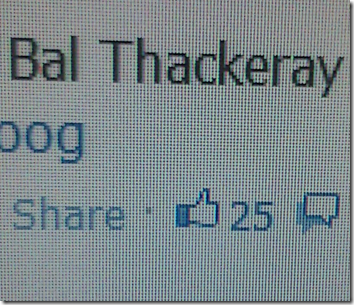
The section penalises anyone who sends “offending” or “annoying” messages through a computer or any communication device, with a maximum penalty of three years’ imprisonment. Two women from around Mumbai were arrested for sharing and liking a Facebook status criticising the bandh-like situation in Mumbai after the death of political supremo Thackeray.
Chief justice of India Altamas Kabir admitted Shreya Singhal’s petition and said: “We were wondering why no one has approached the Supreme Court (over this) and even thought of taking up the issue suo moto.” [NDTV]
Senior advocate Mukul Rohatgi argued for Singhal today and when questioned by the judges on her standing, responded: “She is a law student and a Facebook user, unlike most of us.” [via @aparatbar]
In her plea, Singhal noted: “The phraseology of Section 66A of the IT Act, 2000 is so wide and vague and incapable of being judged on objective standards, that it is susceptible to wanton abuse and hence falls foul of Article 14, 19 (1)(a) and Article 21 of the Constitution.
She has sought to “reconcile section 41 and 156 (1) of the Criminal Procedure Code with Article 19 (1)(a) of the Constitution”. In other words, she has asked the court to disallow arrest without warrant and police investigation without a magisterial order for offences under the Indian Penal Code or any other laws that involve the freedom of speech.
Further hearing in the matter is posted for tomorrow, when attorney general GE Vahanvati will appear before the bench on behalf of the government. [Medianama]
Meanwhile, India’s telecom ministry has issued guidelines to states ordering that police officers must obtain the prior permission of the deputy commissioner of police (DCP) before registering cases under section 66A. In case of metropolitan cities, the permission would have to be obtained from the inspector general (IG) of police. [Hindu Businessline]
Station level officers, like those who booked the charge against the bandh critics, would now not be able to do so if the guidelines were followed. But cyber law expert Pavan Duggal told the Wall Street Journal that the guidelines remained inconsequential without an amendment to the Act itself.
threads most popular
thread most upvoted
comment newest
first oldest
first
This case is worthy of note in terms of abuse of the IT act as well.
articles.timesofindia.indiatimes.com/2012-09-17/social-media/33901476_1_bravery-award-facebook-page-comments
If there is injustice in one segment it doesn't mean we cant highlight those who fight the injustice in other another segment.
Further this isnt hyper. Its a reporting of a PIL which seeks to redress the root cause of the problem relating to the misuse of 66A.
Thats how law works. Its the grandest family run business of all time.
That being said on an average a great lawyers son will usually be better than an average lawyer just because of the sheer experience he or she gains from observing or learning from the parent.
There is one thing you learn as a lawyer as you age and mature. Using high flung words to describe rather simple things usually has the opposite effect of what ever it is you thought you would achieve by using the high flung words in the first place.
The key to good writing is not to try and sound like a poor man's Shakespeare, but to write clearly and to the point. As Ms. Singhal matures into a good lawyer, one day, she will realize how silly her writing of today was.
One last piece of recommendation - Don't try too hard. It shows.
Who the hell uses the term GAP YEAR in India? She definitely knows how to use media to paint a glowing picture.
Also, DB initially starts off by saying "a young Delhi law graduate" and then follows it up with "She came back home in July for her gap year and applied for law schools." So, which is it? Is she a "Gap Year" person applying for law schools, or did she already "graduate" law school?
Also, "critic" above is right. Why all the references to the lineage? Does that make her genetically more special somehow? Bristol is a crap school by all academic standards. Studying Astrophysics at a crap school still makes you a crappy graduate. Just saying.
I concur!
"The 66A ITA Petition filed by Shreya Singhal in SC on November 29, 2012 was neither admitted nor was any notice issued. Its just that the Petitioner was asked to serve a copy of the Petition on the Attorney General…. Just to set the facts straight."
Was a PIL accepted on file or wasn't ? Will LI put out the facts please ?
threads most popular
thread most upvoted
comment newest
first oldest
first